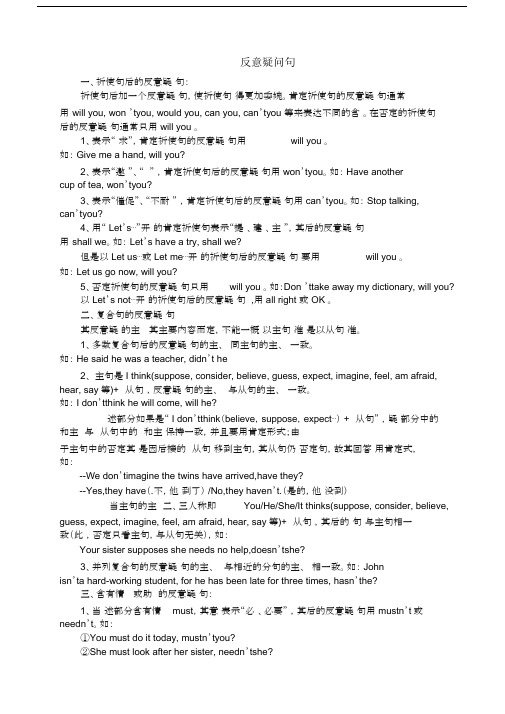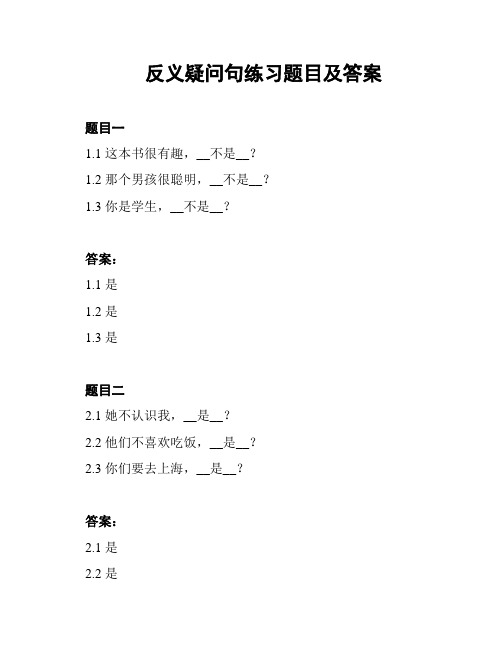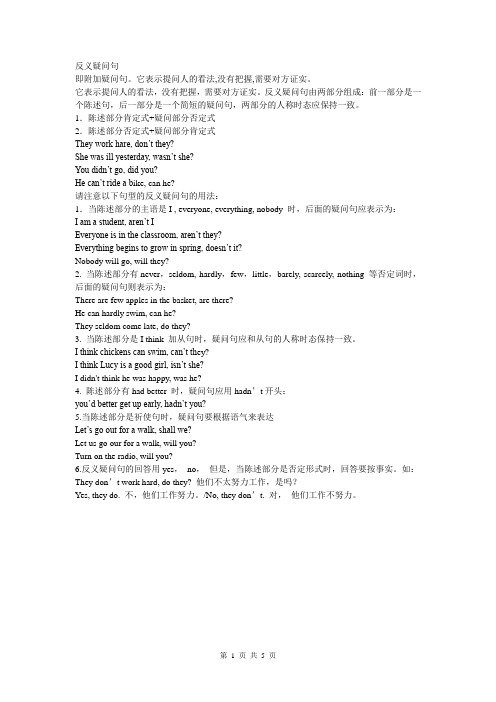(完整版)反义疑问句练习题和答案讲解(可编辑修改word版)
反义疑问句详细讲解及习题及答案

反义疑问句一.句型解释反义疑问句(The Disjunctive Question):即附加疑问句。
它表示提问人的看法,没有把握,需要对方证实。
反义疑问句由两部分组成:前一部分是一个陈述句,后一部分是一个简短的疑问句,两部分的人称时态应保持一致。
1.陈述部分肯定式+疑问部分否定式2.陈述部分否定式+疑问部分肯定式She was ill yesterday, wasn’t she?You didn’t go, did you?二.特殊的句型1.祈使句。
祈使句后一般加上will you或won't you构成反意疑问句,用will you 多表示“请求”,用won't you 多表示提醒对方注意。
例如:Let引导的祈使句有两种情况:1) Let's...,后的反意疑问句用shall we或shan't we。
例如:Let's go home, shall we/ shan't we? 回家吧,好吗?2)Let us/me...后的反意疑问句用will you或won't you。
例如:Let me have a try, will you/won't you?3)祈使句都用will you 或won’t you2.当陈述部分含I think (believe, suppose...)that... 结构时,其反意疑问句须与从句的主、谓语保持一致,注意主句的主语必须是第一人称。
例如:I don't think he will come, will he?若是非第一人称,则与主句的主语相一致He thinks that she will come, doesn’t he?反意疑问句的陈述部分为I(We) don’t think(believe, suppose, consider)+ that从句时,从句为否定意义,问句部分的动词和主语仍与that从句保持一致且用肯定式。
反义疑问句练习题(附答案)

反意疑问句反意疑问句一、祈使句后的反意疑问句:祈使句后加一个反意疑问句,使祈使句变得更加委婉。
肯定祈使句的反意疑问句通常用will you, won’t you, would you, can you, can’t you等来表达不同的含义。
在否定的祈使句后的反意疑问句通常只用will you。
表示“请求”,肯定祈使句的反意疑问句用will you。
如:Give me a hand, will you?2、表示“邀请”、“劝诱”时,肯定祈使句后的反意疑问句用won’t you。
如:Have another cup of tea, won’t you?3、表示“催促”、“不耐烦”时,肯定祈使句后的反意疑问句用can’t you。
如:Stop talking, can’t you?4、用“Let’s…”开头的肯定祈使句表示“提议、建议、主张”,其后的反意疑问句用shall we。
如:Let’s have a try, shall we?但是以Let us…或Let me…开头的祈使句后的反意疑问句则要用will you。
如:Let us go now, will you?5、否定祈使句的反意疑问句只用will you。
如:Don’t take away my dictionary, will you?以Let’s not…开头的祈使句后的反意疑问句,用all right或OK。
二、复合句的反意疑问:复合句的反意疑问的主谓语要视其主要内容而定,不能一概说以主句为准还是以从句为准。
1、多数复合句后的反意疑问句的主、谓语同主句的主、谓语一致。
如:He said he was a teacher, didn’t he主句是I think(suppose, consider, believe, guess, expect, imagine, feel, am afraid, hear, say等)+宾语从句时,反意疑问句的主、谓语应与从句的主、谓语一致。
(完整word版)反义疑问句练习题(附答案).doc

反意疑问句一、祈使句后的反意疑句:祈使句后加一个反意疑句,使祈使句得更加委婉。
肯定祈使句的反意疑句通常用will you, won ’tyou, would you, can you, can’tyou 等来表达不同的含。
在否定的祈使句后的反意疑句通常只用 will you 。
1、表示“ 求”,肯定祈使句的反意疑句用will you 。
如: Give me a hand, will you?2、表示“邀”、“ ” ,肯定祈使句后的反意疑句用 won’tyou。
如: Have anothercup of tea, won’tyou?3、表示“催促”、“不耐” ,肯定祈使句后的反意疑句用 can’tyou。
如: Stop talking,can’tyou?4、用“ Let’s⋯”开的肯定祈使句表示“提、建、主”,其后的反意疑句用shall we。
如: Let’s have a try, shall we?但是以 Let us⋯或 Let me⋯开的祈使句后的反意疑句要用will you 。
如: Let us go now, will you?5、否定祈使句的反意疑句只用will you 。
如:Don ’ttake away my dictionary, will you?以Let’s not⋯开的祈使句后的反意疑句 ,用 all right 或 OK 。
二、复合句的反意疑句其反意疑的主其主要内容而定,不能一概以主句准是以从句准。
1、多数复合句后的反意疑句的主、同主句的主、一致。
如: He said he was a teacher, didn’t he2、主句是 I think(suppose, consider, believe, guess, expect, imagine, feel, am afraid, hear, say等)+从句,反意疑句的主、与从句的主、一致。
如: I don’tthink he will come, will he?述部分如果是“ I don’tthink(believe,suppose,expect⋯) +从句” ,疑部分中的和主与从句中的和主保持一致,并且要用肯定形式;由于主句中的否定其是因后接的从句移到主句,其从句仍否定句,故其回答用肯定式,如:--We don’timagine the twins have arrived,have they?--Yes,they have(.不,他到了) /No,they haven’t.(是的,他没到)当主句的主二、三人称即You/He/She/It thinks(suppose, consider, believe, guess, expect, imagine, feel, am afraid, hear, say等)+从句,其后的句与主句相一致(此,否定只看主句,与从句无关),如:Your sister supposes she needs no help,doesn’tshe?3、并列复合句的反意疑句的主、与相近的分句的主、相一致。
(完整版)初中英语反义疑问句经典练习(含答案)(改)

反义疑问句练习题1.Lind.at.nothin.thi.morning.___.......A.didn’.sh. B.wa.sh. C.di.sh. D.wasn’.sh.2.There’.hardly__.mil.i.th.bottle._____there..A.no.isn’..B.some.i..C.little.isn’..D.any.i.3.H.ha.neve.ridde..hors.before.___..... A.doe.h..B.ha.h..C.hasn’.h..D.doesn’.h.4..H.seldo.cam.here._____...Ye.sir.. A.didn’.h..B.doe.h..C.doesn’.h..D.di.h.5.Everythin.seem.al.right.____........ A.doe.i..B.don’.the..C.won’.i..D.doesn’.i.7.On.can’.b.to.modest.ca.____....... A.on..B.h..C.i..D.w.8.N.on.faile.i.th.exam.____........ A.wa.h..B.di.on..C.di.the..D.didn’.h.11.H.can’.b.he.father.____.he........A.i..B.isn’..C.ca..D.can’.12.The.hav.n.tim.t.visi.th.museum._____..A.d.the..B.haven’.the..C.don’.the..D.wil.the.18.H.dislike.th.tw.subjects.____.he.....A.doe..B.doesn’..C.i..D.isn’.eles.now.____.......A.ar.the..B.aren’.the..C.i.i..D.isn’.i.23.Let’.g.ther.b.bus.___..........A.wil.yo..B.shal.w..C.don’.yo..D.wil.yo.24.Le.u.g.t.pla.football.___........ A.wil.yo..B.shal.w..C.d.w..D.ar.w.25.Don’.forge.t.giv.Poll.som.foo.an.chang.he.water._.A.wil.yo..B.shal.w..C.won’.yo..D.d.yo.26..Let’.g.shoppin.thi.afternoon._____.. .Al.right.A.wil.w..B.shal.w..C.don’.w..D.ar.w.27..Pas.m.th.dictionary._____...Yes.wit.pleasure.A.woul.yo..B.wil.yo..C.won’.yo..D.wouldn’.yo.30.Ther.i.littl.wate.i.th.glass.____.A.isn’.ther..B.isn’.i..C.i.i..D.i.ther.32.Ther.won’.b.an.concer.thi.Saturda.evening.____..A.wil.ther.no..B.wil.ther..C.i.ther..D.won’.33...gues.sh.taugh.hersel.Japanese.______.. .Yes. A.don’...B.di.sh..C.d...D.didn’.sh.34..don’.believ.yo.ar.right.____...........A.ar.yo..B.d.yo..C.won’.yo..D.d.35.Sh.doesn’.thin.tha.To.sing.bes.i.th.class.____..A.doe.sh..B.doesn’.sh..C.doe.h..D.doesn’.h.37..kno.yo.didn’.wan.t.hur.me.____........A.di.yo..B.didn’.yo..C.d...D.don’..38.I.m.fathe.wer.her.h.woul.b.ver.happy.____..A.weren’.h..B.wer.h..C.wouldn’.h..D.woul.h.1.It’.ver.ho.today, _______________ ........2. H.ca.spea.Chinese, _______________ ?3. Meime.studie.i..middl.school, _______________ .t., _______________ ?5.Don’t go ou.a.night, _______________ .......6.H.neve.love.col.weathe., _______________ ?7.Yo.finishe.th.tas.yesterday, _______________ ...9.To.ha.bee.t.Singapor., _______________ ?10.Th.story i.littl.interesting, _______________ ?11.Everythin.start.t.gro.i.spring, _______________ . 12.H.ca.hardl.finis.hi.homework, _______________ ?13.I’.i.Clas.3,Grad.2, _______________ ........14.Let’.g.shoppin., _______________ ?15.Sh.doesn’.lik.climbin.hill., _______________ .... 16..don’.thin.i.i.col.today, _______________ ?17.Yo.thin.h.i..goo.fligh.attendant,. _______________ .18.Nobod.know.wher.sh.lives, _______________ ?19.Fe.student.ca.answe.th.question, _______________ ..20.Mik.like.English. _______________ ?21.That was a wonderful night, _______________ ? 22.Your sister helped him, _______________ ?23.Tom is skating, _______________ ?24.You aren’t a teacher, _______________ ?25.They haven’t been to the Great Wall, _______________ ? 26.You will join the soccer team, _______________ ?27.He likes neither apples nor pears, _______________ ? 28.There are some good books for you, _______________ ?29.They have been there twice, _______________ ? 30.Let’s do it now, _______________ ?31.You dislike this kind of gifts, _______________ ? 32.Nothing is impossible, _______________ ?33.Everything is possible, _______________ ? 34.He doesn’t go to school by bus, _______________ ?35.There is little milk left in the bottle, _______________ ?36.Let us clean the classroom by ourselves, _______________ ?37.He has studied here for about four years, _______________ ?38.You have never lost money before, _______________ ?39.Few of them hurt themselves in the accident last night, _______________ ?40.Peter could hardly see the words on the blackboard, _______________ ?41.She’s American, _______________ ? 42.There will be a volleyball match in our school, _______________ ? 43.Don’t smoke in the reading-room, _______________ ? 44.I don’t think he is right, _______________ ?45.You must do your homework by yourself, _______________ ?46.You mustn’t touch the machine, _______________ ?47.He must be a worker, _______________ ? 48.Someone looked for me yesterday, _______________ ?49.I’m a teacher, _______________ ? 50.What a nice watch, _______________ ?51.I wish to use your ruler, _______________ ? 52.I have to stay at home, _______________ ?53.You’d better wear warm clothes today, _______________ ?54.What he needs is his parents’ love, _______________ ?55.You’d like a cup of tea, _______________ ? 56.Don’t be late again, _______________ ?57.Their prices are really low, _______________ ? 58.Reading is good for you to learn English, _______________ ? 59.No one knows about it, _______________ ? 60.I think you should study hard, _______________ ?Key: 1—5 CDBDD 6—10 BACDC 11—15 AABAB 16—20 CCBBA 21—25CDBAA 26—30 BBBAD 31—35 BBDAA 36—38 AAC附加答案:..isn’.it.. 2.can’.h.. 3.doesn’.she..4.doe.he... 5.wil.yo.6.does.he.7.didn’.you .8..isn’....9.hasn’.he...10.i.it11.doesn’t it 12.can he 13 .aren’t I 14.shall we 15.does she16.is it 17.don’t you18does it 19. can they 20.doesn’t he21.wasn’t it 22.didn’t she 23.isn’t he 24.are you 25.have they26.wont you 27.does he 28.aren’t there 29.haven’t they 30.shall we31.don’t you 32.is it 33.isn’t it 34.does he 35.is th ere36.will you 37.hasn’t he 38.have you 39.did they 40.could he41.isn’t she 42.won’t there 43.will you 44.is he 45.mustn’t you46.must you 47.isn’t he 48.didn’t they 49.aren’t I 50.isn’t it51.may I 52.don’t I 53.hadn’t you 54.isn’t it 55.wouldn’t you56.will you 57.aren’t they 58.isn’t it 59.do they 60.shouldn’t you。
反义疑问句练习题目及答案

反义疑问句练习题目及答案题目一1.1 这本书很有趣,__不是__?1.2 那个男孩很聪明,__不是__?1.3 你是学生,__不是__?答案:1.1 是1.2 是1.3 是题目二2.1 她不认识我,__是__?2.2 他们不喜欢吃饭,__是__?2.3 你们要去上海,__是__?答案:2.1 是2.2 是2.3 是题目三3.1 他不喜欢看电视,__是__?3.2 你不觉得这个问题很有意思,__是__?3.3 她没去过北京,__是__?答案:3.1 是3.2 是3.3 是题目四4.1 他们不会唱歌,__是__?4.2 这是个好主意,__不是__?4.3 他喜欢看电影,__不是__?答案:4.1 是4.2 不是4.3 不是题目五5.1 她不懂汉语,__是__?5.2 你会游泳,__是__?5.3 他们喜欢吃饭,__是__?答案:5.1 是5.2 是5.3 是题目六6.1 这不是你的手机,__是__?6.2 你不喜欢这个颜色,__是__?6.3 他们会来参加聚会,__是__?答案:6.1 是6.2 是6.3 是题目七7.1 他没有听说过这个地方,__是__?7.2 你不想去旅行,__是__?7.3 她知道这个答案,__是__?答案:7.1 是7.2 是7.3 是题目八8.1 我今天晚上有时间,__不是__?8.2 他没有考试,__是__?8.3 你们都明白这个问题,__是__?答案:8.1 不是8.2 是8.3 是。
反义疑问句练习题及答案解析

反义疑问句练习题及答案解析反义疑问句是英语语法中的一种问句形式,用于在表达某种观点或态度时,征求对方的认同或否认。
反义疑问句通常由两个部分组成,主句和从句,其中主句陈述事实,并以逗号结尾,从句是对主句的反问。
以下是一些反义疑问句的练题及答案解析:1. He is a doctor, isn't he?答案:是解析:句子的主语是 "He",陈述了 "He" 是一个医生。
主句以逗号结尾,从句表达了 "He" 是一个医生这一观点,并征求对方的认同。
2. They don't like coffee, do they?答案:否解析:句子的主语是 "They",陈述了 "They" 不喜欢咖啡。
主句以逗号结尾,从句表达了 "They" 不喜欢咖啡这一观点,并征求对方的否认。
3. You can swim, can't you?答案:是解析:句子的主语是 "You",陈述了 "You" 能游泳。
主句以逗号结尾,从句表达了 "You" 能游泳这一观点,并征求对方的认同。
4. She hasn't finished her homework, has she?答案:否解析:句子的主语是"She",陈述了"She" 没有完成她的作业。
主句以逗号结尾,从句表达了 "She" 没有完成她的作业这一观点,并征求对方的否认。
5. He won't be late, will he?答案:否解析:句子的主语是 "He",陈述了 "He" 不会迟到。
主句以逗号结尾,从句表达了"He" 不会迟到这一观点,并征求对方的否认。
(完整版)中考反义疑问句详解及练习和答案

即附加疑问句。
它表示提问人的看法,没有把握,需要对方证实。
它表示提问人的看法,没有把握,需要对方证实。
反义疑问句由两部分组成:前一部分是一个陈述句,后一部分是一个简短的疑问句,两部分的人称时态应保持一致。
1.陈述部分肯定式+疑问部分否定式2.陈述部分否定式+疑问部分肯定式They work hare, don’t they?She was ill yesterday, wasn’t she?You didn’t go, did you?He can’t ride a b ike, can he?请注意以下句型的反义疑问句的用法:1.当陈述部分的主语是I , everyone, everything, nobody 时,后面的疑问句应表示为:I am a student, aren’t IEveryone is in the classroom, aren’t they?Everything begins to grow in spring, doesn’t it?Nobody will go, will they?2. 当陈述部分有never,seldom, hardly,few,little,barely, scarcely, nothing 等否定词时,后面的疑问句则表示为:There are few apples in the basket, are there?He can hardly swim, can he?They seldom come late, do they?3. 当陈述部分是I think 加从句时,疑问句应和从句的人称时态保持一致。
I think chickens can swim, can’t th ey?I think Lucy is a good girl, isn’t she?I didn't think he was happy, was he?4. 陈述部分有had better 时,疑问句应用hadn’t开头:you’d better get up early, hadn’t you?5.当陈述部分是祈使句时,疑问句要根据语气来表达Let’s go out for a walk, shall we?Let us go our for a walk, will you?Turn on the radio, will you?6.反义疑问句的回答用yes,no,但是,当陈述部分是否定形式时,回答要按事实。
反义疑问句练习题(附答案)

反意疑问句一、祈使句后的反意疑问句:祈使句后加一个反意疑问句,使祈使句变得更加委婉。
肯定祈使句的反意疑问句通常用will you, won’t you, would you, can you, can’t you等来表达不同的含义。
在否定的祈使句后的反意疑问句通常只用will you。
1、表示“请求”,肯定祈使句的反意疑问句用will you。
如:Give me a hand, will you?2、表示“邀请”、“劝诱”时,肯定祈使句后的反意疑问句用won’t you。
如:Have another cup of tea, won’t you?3、表示“催促”、“不耐烦”时,肯定祈使句后的反意疑问句用can’t you。
如:Stop talking, can’t you?4、用“Let’s…”开头的肯定祈使句表示“提议、建议、主张”,其后的反意疑问句用shall we。
如:Let’s have a try, shall we?但是以Let us…或Let me…开头的祈使句后的反意疑问句则要用will you。
如:Let us go now, will you?5、否定祈使句的反意疑问句只用will you。
如:Don’t take away my dictionary, will you?以Let’s not…开头的祈使句后的反意疑问句,用all right或OK。
二、复合句的反意疑问句其反意疑问的主谓语视其主要内容而定,不能一概说以主句为准还是以从句为准。
1、多数复合句后的反意疑问句的主、谓语同主句的主、谓语一致。
如:He said he was a teacher, didn’t he2、①主句是I think(suppose, consider, believe, guess, expect, imagine, feel, am afraid, hear, say 等)+宾语从句时,反意疑问句的主、谓语应与从句的主、谓语一致。
- 1、下载文档前请自行甄别文档内容的完整性,平台不提供额外的编辑、内容补充、找答案等附加服务。
- 2、"仅部分预览"的文档,不可在线预览部分如存在完整性等问题,可反馈申请退款(可完整预览的文档不适用该条件!)。
- 3、如文档侵犯您的权益,请联系客服反馈,我们会尽快为您处理(人工客服工作时间:9:00-18:30)。
反义疑问句练习1.Zhou Ming has few English magazines, ?A.does heB.doesn’t heC.has heD.hasn’t he2.Cindy could hardly speak English three years ago, ?A. couldn't she?B. could sheC. can she3.Alice had a wonderful time yesterday, ?A. hadn’t sheB. wasn’t sheC. didn’t sheD. wouldn’t she4.–She didn’t come to schoolyesterday, did she?–, though she was not feeling well.A. No, she didn’tB. Yes, she didn’tC. No, she didD. Yes, she did5.---He hardly spent any time on his subjects, ?--- , so he does badly in his lessons.A .didn’t he, Yes B. did he, Yes C. didn’t he, No D. did he, No 6.He’s read this book before, ?A. hasn’t heB. doesn’t heC. isn’t heD. wasn’t he7.–Let’s go for a walk, ?-- OK, I’m coming . Don’t forget to bring your camera, ? A. will you; will you B. will you; shall weC. shall we; shall weD. shall we; will you8.John had a short walk after lunch, ?A. did heB. didn't heC. had heD. hadn't he9.Nancy hardly rings you up, ?A. doesn’t sheB. does sheC. doesn’t NancyD. does Nancy 10.---Your brother often disagrees with you, he ?--- . We often have different opinions.A.does; YesB. doesn’t ;YesC. does; NoD. doesn’t; No 11.Kate’s never late for school, ?A.isn’t sheB.hasn’theC.is sheD.has she12.--- Liu Tao has never read the book The Adventure of Tom Sawyer , he?--- . He told me it's very interesting. He'd like to read it again.A. is; No, he isn'tB. has; Yes, he hasC. isn’t; Yes, he isD. hasn’t; No, he hasn't13.—He’s never late for school, ?—No, he isn’t .He is always very early.A. is heB. isn’t heC. hasn’t heD. has he 14.—There’s little meat left in the fridge, ?—. I’ll get some on my way home.A. is there, YesB. isn’t there, YesC. is there, NoD. isn’t there, No 15.—Tom finished his homework, didn’t he?—, though he was ill yesterday.A. No, he didn’tB. Yes, he didC. Yes, he doesD. No, he doe sn’t16.There is little water in the cup, ?A. is thereB. isn’t thereC. isn’t itD. is it17.He’s still not understood by his close friend although he has said sorryto him, ?A. hasn’t heB. has heC. isn’t heD. is he18.You have never visited the place before, you?A. didB. didn’tC. haveD. haven’t19.Don't keep poison in the kitchen, ?A. do youB. shall weC. will youD. don't you20.There are no museums in our city, ?A. aren’t thereB. are thereC. is thereD. isn’t there21.Your father is playing the piano very well, he?A.isB.isn’tC.doesD.doesn’t22.—It’s her birthday tomorrow, ?—Yes, let’s have a surprise party for her.A. isn’t itB. isn’t sheC. doesn’t itD. doesn’t she23.--- He’s never stolen anything before, he?--- . It’s his third time to be taken to the police station.A. hasn’t; YesB. has; NoC. has; YesD. is; No24.—It’s her birthday tomorrow, ?—Yes, let’s have a surprise party for her.A. isn’t itB. isn’t sheC. doesn’t itD. doesn’t she25.-----Your father never watched the drama series on TV,?----- . He thinks theses drama series are boring and dull.A.d oes he; Yes, he does.B.does he; No, he doesn’tC.doesn’t he ; Yes, he does.D.doesn’t he ; No, he doesn’t .26.—Tom is an honest boy, he?—Yes. We trust him all the time.A. isn’tB. isC. doesD. doesn’t27.Good, you’ve done it well! You need no more help from us, .?A. do youB. need youC. don’t youD. needn’t you28.His father had an important meeting just now, ?A. did heB. had heC. didn't heD. hadn't he29.-- You used to be short, didn’t you?-- . I was the shortest in my class.A. Yes, I did.B. No, I didn’t.C. Yes, I was.D. No, I wasn’t.30.The farmer is working now. He’s fed the horse and the sheep,?A. doesn’t heB. isn’t heC. wasn’t heD. hasn’t he参考答案1.A【解析】试题分析:句意为:周明几乎没有英语杂志对吗?这是一个反义疑问句,反义疑问句的结构遵循前肯定后否定或者前否定后肯定,前后人称、时态一致的原则。
结合语境可知,few 有否定意义,故应选A。
考点:考查反义疑问句。
2.B【解析】试题分析:hardly 意为“几乎不”,是一个否定意义的副词,反意疑问句要遵循“前肯后否,前否后肯”的原则,句意:Cindy 三年前几乎不能讲英语,不是吗?故选B。
考点:考查反意疑问句的用法。
3.C【解析】试题分析:句意:爱丽丝昨天过得很愉快,对吗?所以选C。
考点:考查反意疑问句。
【答案】D【解析】试题分析: 句意:昨天她没有来学校是吗?不,尽管她感觉不舒服,但是她还是来了。
此题考查反意疑问句,根据句意,故选D。
考点:考查反意疑问句的答语。
5.D【解析】试题分析:句意:他几乎不在功课上花费时间,是吗?是,所以他功课很差。
前面有hardly 表否定,所以反义疑问句用肯定的,排除A、C,根据后面的答句说他课程学得很差,表示他几乎不学习,所以选No,表示不学习的意思。
考点: 考查反意疑问句。
6.A【解析】试题分析:句意:以前他已经读过这本书了,不是吗?因为前面的缩写代表的是has,反意疑问句,前肯定,后否定,选A。
考点:考查反意疑问句.7.D【解析】试题分析:句意:咱们去散散步,好吗?好吧,我就来。
别忘了带上你的相机,好吗?反意疑问句是英语四大问句之一,它是由一个陈述句加上一个短问句而构成的。
反意疑问句的基本构成形式是:陈述句+ 动词(肯定或否定)+主语?使用反意疑问句要注意以下若干对应规则:反意疑问句中问句部分的动词与陈述部分的动词在语气上成相反的对应关系,即:肯定+否定?否定+肯定?反意疑问句中问句部分的动词与陈述部分的动词种类要对应一致。
反意疑问句中问句部分的动词在时态上应和陈述部分的时态一致。
陈述部分为Let me……时,问句部分习惯上用shall I? 或will you?形式。
陈述部分为Let us…… 时,问句部分习惯上用will you?形式。
